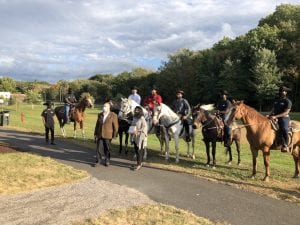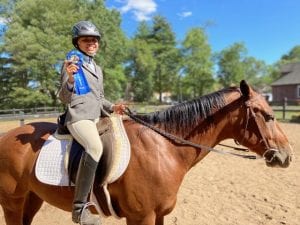Ebony Horsewomen, Incorporated is a non-profit equestrian facility in the North End of Hartford that has been empowering Hartford, Bloomfield, and Windsor residents through equine programs for over 36 years. Patricia “Pat” Kelly is the program founder and CEO. The programs offered by Ebony Horsewomen include youth development, mental health, and Equine Assisted Psychotherapy.
An Oasis in Hartford’s North End
The driveway into the Ebony Horsewomen facility leads visitors to a calm oasis amidst the backdrop of Hartford, racial injustice, a global pandemic, and other stressors of everyday life. Keney Park is the largest municipal park in New England with 693-acres and miles of trails. Those trails are accessible via a short walk out of the barns and past the horse paddocks.
Chaz Carroll is giving us a tour of the property. He is the facilities manager and serves as the mentor and supervisor for the Junior Mounted Patrol Unit. “My dad was a Hartford policeman and I had a fascination with horses,” he says. “I started here as a youth with the Saturday Saddle Club. I was working full-time for the Hartford Community Court and came back to Ebony Horsewomen through an assignment with them. I’ve been here ever since.”
The main barn has a wing connected to it with a classroom, library, and staff offices. The classroom is currently set up with social distancing pods that youth use for remote schooling. An indoor riding ring and a second barn are short distances away. The second barn has offices for the saddles and equipment of the Ladies Dressage Team and Junior Mounted Patrol Unit, and there are offices and a conference room for the mental health staff.
Horses quietly relax in small groups in the paddocks behind the barns. A flock of chickens alerts us to their presence in a pen adjacent to the barn and gardens. Over in the indoor arena, War Paint, one of the horses, is hanging out by himself. He’s 28 and a senior member of the herd. Chaz remembers riding him as a boy in the program. War Paint has some health issues due to his advanced age and the softer footing of the indoor arena keeps him comfortable. He’s bright and perky as he walks over to the gate to greet us.
The horses receive exceptional care, as is evidenced by the health and well-being of War Paint and other senior equines. Ebony Horsewomen works with Beckett Veterinary Services for equine care and their farrier, a graduate of the Cornell University Farrier Program is an alumnus of their program who sees to their equine hoof care. Staff also receive training and continuous education through The Herd Institute, a NBCC approved continuing education provider that offers training and certifications in equine facilitated psychotherapy and learning and through the UConn Equine Extension program.
“I first met the Ebony Horsewomen staff when they came to the UConn Riding Camp Instructor Horsemanship Safety Camp Training,” says Dr. Jenifer Nadeau, the UConn Equine Extension Specialist. “They have also participated in the Connecticut Horse Symposium. It is fabulous what they are doing for the community, and how dedicated and hard-working they are. I can definitely see the impact they are having just by meeting their instructors and the youth at my programs.” A UConn 4-H program is also part of the programming offered by Ebony Horsewomen.
Empowerment Through an Equestrian Program

Each of the youth programs has a classroom component. The Saturday Saddle Club starts their day with chores. Once the barn is taken care of, they head into the classroom. Then, it’s on to lunch and riding time. The Ladies Dressage Team meets three times per week, two classes are held virtually on weekdays due to the pandemic, and they ride during an in-person session.
Spending time with the horses helps the rest of the world disappear for a while. “When you ride through Keney Park none of the other stuff is there, the tough neighborhood of Hartford’s North End or the problems the students may be facing,” Chaz says. “The Junior Mounted Patrol Unit helps the young men acquire the drive and motivation to be something. We are also trying to show the community we are here when we ride the horses around the neighborhood.”
The Ladies Dressage Team learns life skills in addition to dressage and equitation. The young women often come to Ebony Horsewomen focused on their hair and body. The conversation changes when they begin working with the horses. It’s about how to sit the trot or another aspect of horsemanship. The level of importance shifts to the internal instead of the external that media and other influences push.
“It’s never about the ribbons when we go to a horse show,” Pat says. “Our youth have to understand three things, classism, racism, and business. Sometimes we go to a horse show and our students won’t place well, but the other riders are happy to have them there. That’s classism. Our students go to another show and get a lesson on dealing with racism from people that have negative reactions to our participation. And then we go to a third show where they get a lesson on business because the riders from that barn win all the classes. Our students need to understand the difference between classism, racism, and business and how to respond to it.”
Horse shows provide one avenue to learn, and the staff at Ebony Horsewomen ensure these lessons are always in a supportive environment. “We are healing kids and horses,” Pat continues. “They are learning to manage life’s challenges and understanding the life they were born into. When you’re born into a Black community that’s all you know. We are getting our students out to other places so that they meet some really nice people. They meet real and authentic people and they begin to understand how not to classify people. You have to give everyone a chance and get to know them.”
A Bright Future
The positive impact on participants and changes the program has facilitated in the community are creating a legacy for the program, and a bright future as it continues to expand. “Seeing the faces of our participants gets me here every morning,” Chaz says. “We are here to help someone’s life and let them forget they are in pain and trauma. Seeing the difference in a participant from when they arrive to when they head home at the end of a session is why we are here. All the staff feel the same way. Ebony Horsewomen leaves a lasting impact on the people that work here and the program participants.”

Ebony Horsewomen wants to keep pushing themselves higher and do more to serve the community that they’ve been a part of for over 36-years. Funding and resources are always a challenge for any non-profit. The program needs monetary donations, volunteers, and community support through awareness building.
Younger horses are another need the team has identified. Most of the herd is over 20 years old. They are senior horses, and each can only have limited responsibilities with participants. Horses have a home for life and excellent care at Ebony Horsewomen, and a few younger horses would allow the program to continue growing and serving as that catalyst for change for more participants.
Private riding lessons and horse boarding are also available to those interested and provide a source of income to support programming. People come to Ebony Horsewomen to experience riding. Horseback riding lessons are different here, they provide music and therapeutic exercises. People love it, they connect with the music and it relaxes them. The team is discussing setting up a volunteer system for horse care when COVID-19 subsides.
“The proudest moments for me is always something the kids have elevated to – kids that would be dead if not for a horse,” Pat reflects. “The horses give the kids a place to come where they’re not treated differently because of their circumstances.”
Learn more about Ebony Horsewomen and how you can support their programs at https://www.ebonyhorsewomen.us/.
Article by Stacey Stearns